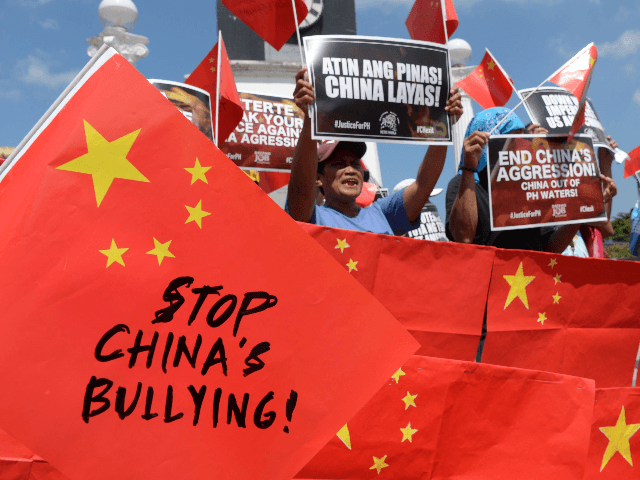Philippine news outlets reported Wednesday that an unidentified man attacked a Chinese restaurant in the Manila metropolitan area with a grenade, which did not detonate.
Some reports suggest that the owner of the restaurant suspects a disgruntled former employee. The attack occurred, however, in a particularly volatile political environment in the Philippines, a week after protesters flooded Manila burning Chinese flags in protest of a Chinese ship sinking a Filipino fishing vessel near Recto Bank, a sovereign Philippine territory in the South China Sea.
China claimed the incident was an “accident” and that the ship’s decision to leave the sunken ship’s crew to drown was necessary because it feared an attack from other Philippine vessels. The crew survived thanks to help from a Vietnamese ship that happened upon them hours later.
The Communist Party of China claims almost the entire South China Sea, including significant territory within the Philippines’ borders. A 2016 ruling by the Permanent Court of Arbitration at the Hague declared China’s presence in that territory – and, in particular, its construction of artificial islands equipped with military gear – illegal, but Beijing openly declared its intentions to ignore the ruling. President Rodrigo Duterte has refused to challenge China on its claims and has not condemned China for sinking the Philippine ship in early June.
The Philippine Inquirer reported Wednesday that the grenade attack targeted Pasay City’s Rong Hui Chinese restaurant. Police found the undetonated grenade at 2 a.m. local time. Police investigating the incident reportedly had enough evidence to identify the suspect as a man, who threw the grenade into the restaurant and fled before eyewitnesses could identify him. The Abante tabloid added more details: according to the police, surveillance camera footage showed the grenade toss occurring at dawn and the man passed by the restaurant quickly on a motorcycle. The grenade reportedly did not have its safety lever anymore and police successfully prevented it from exploding after its discovery using a water cannon disruptor.
Bryan Chua, the owner of the restaurant, reportedly said that he received a text message threat to his restaurant before the grenade attack. Abante reports that Chua suspected a disgruntled former employee of the attack. Police at press time have not verified the suspect’s identity.
The incident caused no injuries. Multiple Chinese nationals were in the restaurant at the time of the attack, according to Abante.
Until police identify the suspect, there is no guarantee that a former employee was responsible for the attack for personal reasons. The optics of the incident, however, are shaped in part by the hundreds of Filipinos who gathered in nearby Manila a week ago to burn Chinese flags in protest of the Communist Party’s repeated invasions into their territory. China’s belligerence triggered similar attacks on Chinese restaurants and alleged Chinese tourists in Turkey in 2015, on that occasion to protest China’s human rights violations against Uighur Muslims. On that occasion, however, the Turks accidentally attacked a Korean tourist group and a Uighur Chinese restaurant.
The protesters organizing in Manila last week told journalists covering the event that Duterte’s complicity with Beijing made them feel that a public demonstration was necessary.
“Contrary to what Mr. Duterte projects against his critics, his weak positions against Chinese aggression and bullying have only exposed him as a pro-China, anti-Filipino president,” Christian Lloyd Magsoy, a spokesman for the organizing group Defend Philippines Jobs, told the South China Morning Post last week. “China is not just robbing our waters, land, resources and sovereignty, but has long been taking our jobs away from us. What makes it worse is that our own government seems to be allowing these crimes against us to happen.”
Duterte’s spokesman, Salvador Panelo, initially shared the protesters’ wrath.
“We will not allow ourselves to be assaulted, to be bullied, to be the subject of such barbaric, uncivilised and outrageous actions from any source,” he said in the immediate aftermath of the sinking. “We will cut diplomatic relations, that’s what you do whenever there are aggressive acts.”
Following days of silence from Duterte, however, Panelo later urged calm and claimed that the case remained too unclear to blame the communist regime. On Tuesday, Duterte himself finally remarked on the incident outside of his previous calls for calm, decisively stating that China did not attack the Philippine ship.
“There was no confrontation,” he said. “There was no bloody violence. … Well, I’m sorry, but that’s how it is.”
Duterte’s support for China, and the sinking of the Philippine fishing ship, occurred in a climate of significant distrust of China in the island nation. Social Weather Stations (SWS), a Filipino pollster, found in a survey conducted in late March that China was among the least trusted among some of the world’s largest countries in the Philippines, compared to Australia, the United States, and Japan. The poll also found that, even among Filipinos who said they had “much trust” in China, there was “very strong” agreement with a statement asserting that the 2016 Hague ruling means “China should leave the islands it has occupied in the West Philippine Sea.” The West Philippine Sea is a region within the South China Sea.

COMMENTS
Please let us know if you're having issues with commenting.